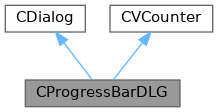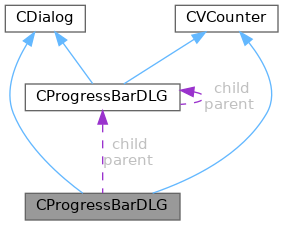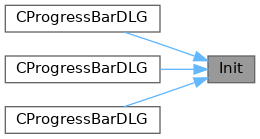#include <ProgressBarDLG.h>


Public Types | |
| enum | { IDD = IDD_PROGBAR } |
Public Member Functions | |
| CProgressBarDLG (LPCTSTR tname=NULL, BOOL dispatcher=FALSE, CWnd *pParent=NULL) | |
| CProgressBarDLG (UINT nIDTemplate, LPCTSTR tname=NULL, BOOL dispatcher=FALSE, CWnd *pParent=NULL) | |
| CProgressBarDLG (CProgressBarDLG *counter, LPCTSTR tname=NULL, BOOL dispatcher=FALSE) | |
| virtual | ~CProgressBarDLG () |
| BOOL | OnInitDialog () |
| virtual CVCounter * | MakeChildCounter (int m) |
| virtual CVCounter * | GetUsableCounter () |
| virtual void | DeleteChildCounter () |
| virtual void | Start (int m=100, char *tn=NULL) |
| virtual void | Stop () |
| virtual void | Init () |
| virtual void | Clear () |
| virtual void | SetMax (int max) |
| virtual void | SetPos (int pos) |
| virtual void | StepIt (int n=1) |
| virtual void | ResetRate (int m, int n) |
| virtual void | PutFill () |
| virtual void | SetTitle (char *tn) |
| virtual bool | isCanceled () |
Public Attributes | |
| CWnd * | pWnd |
| UINT | dialogID |
| CString | title |
| BOOL | enableDisPatcher |
| int | gmax |
| int | base |
| double | grate |
| double | lrate |
| double | prate |
| CProgressCtrl * | progBar |
| CProgressBarDLG * | parent |
| CProgressBarDLG * | child |
Protected Member Functions | |
| virtual void | DoDataExchange (CDataExchange *pDX) |
| virtual BOOL | OnCommand (WPARAM wParam, LPARAM lParam) |
Detailed Description
Definition at line 120 of file ProgressBarDLG.h.
Member Enumeration Documentation
◆ anonymous enum
| anonymous enum |
Constructor & Destructor Documentation
◆ CProgressBarDLG() [1/3]
| CProgressBarDLG | ( | LPCTSTR | tname = NULL, |
| BOOL | dispatcher = FALSE, | ||
| CWnd * | pParent = NULL ) |
Definition at line 23 of file ProgressBarDLG.cpp.
References CProgressBarDLG::dialogID, CProgressBarDLG::enableDisPatcher, CProgressBarDLG::gmax, CProgressBarDLG::IDD, CProgressBarDLG::Init(), CProgressBarDLG::progBar, PROGRESS_COUNTERMAX, CProgressBarDLG::pWnd, and CProgressBarDLG::title.

◆ CProgressBarDLG() [2/3]
| CProgressBarDLG | ( | UINT | nIDTemplate, |
| LPCTSTR | tname = NULL, | ||
| BOOL | dispatcher = FALSE, | ||
| CWnd * | pParent = NULL ) |
Definition at line 42 of file ProgressBarDLG.cpp.
References CProgressBarDLG::dialogID, CProgressBarDLG::enableDisPatcher, CProgressBarDLG::gmax, CProgressBarDLG::Init(), CProgressBarDLG::progBar, PROGRESS_COUNTERMAX, CProgressBarDLG::pWnd, and CProgressBarDLG::title.

◆ CProgressBarDLG() [3/3]
| CProgressBarDLG | ( | CProgressBarDLG * | counter, |
| LPCTSTR | tname = NULL, | ||
| BOOL | dispatcher = FALSE ) |
Definition at line 57 of file ProgressBarDLG.cpp.
References CProgressBarDLG::enableDisPatcher, CProgressBarDLG::Init(), CProgressBarDLG::parent, and CProgressBarDLG::title.

◆ ~CProgressBarDLG()
|
virtual |
Definition at line 68 of file ProgressBarDLG.cpp.
References CProgressBarDLG::child, CProgressBarDLG::parent, and CProgressBarDLG::Stop().

Member Function Documentation
◆ Clear()
|
virtual |
Definition at line 100 of file ProgressBarDLG.cpp.
References CProgressBarDLG::base, CProgressBarDLG::child, CProgressBarDLG::grate, CProgressBarDLG::lrate, CProgressBarDLG::prate, CProgressBarDLG::progBar, CProgressBarDLG::SetPos(), and CProgressBarDLG::title.

◆ DeleteChildCounter()
|
virtual |
Definition at line 177 of file ProgressBarDLG.cpp.
References CProgressBarDLG::child, and CProgressBarDLG::PutFill().

◆ DoDataExchange()
|
protectedvirtual |
Definition at line 134 of file ProgressBarDLG.cpp.
◆ GetUsableCounter()
|
virtual |
Definition at line 191 of file ProgressBarDLG.cpp.
References CProgressBarDLG::child, and CProgressBarDLG::GetUsableCounter().
Referenced by CProgressBarDLG::GetUsableCounter().


◆ Init()
|
virtual |
Definition at line 77 of file ProgressBarDLG.cpp.
References CProgressBarDLG::base, CProgressBarDLG::child, CProgressBarDLG::dialogID, CProgressBarDLG::enableDisPatcher, CProgressBarDLG::gmax, CProgressBarDLG::grate, CProgressBarDLG::lrate, CProgressBarDLG::parent, CProgressBarDLG::prate, CProgressBarDLG::progBar, CProgressBarDLG::pWnd, and CProgressBarDLG::title.
Referenced by CProgressBarDLG::CProgressBarDLG(), CProgressBarDLG::CProgressBarDLG(), and CProgressBarDLG::CProgressBarDLG().

◆ isCanceled()
|
virtual |
Definition at line 351 of file ProgressBarDLG.cpp.
References CProgressBarDLG::isCanceled(), and CProgressBarDLG::parent.
Referenced by jbxwl::copyFPWithCounter(), CDxSRenderView::GetValidVoxelNum(), CProgressBarDLG::isCanceled(), and CDxSRenderView::PrepareVB().


◆ MakeChildCounter()
|
virtual |
Definition at line 163 of file ProgressBarDLG.cpp.
◆ OnCommand()
|
protectedvirtual |
Definition at line 361 of file ProgressBarDLG.cpp.
◆ OnInitDialog()
| BOOL OnInitDialog | ( | ) |
Definition at line 120 of file ProgressBarDLG.cpp.
References IDC_PROGBAR_M, CProgressBarDLG::parent, and CProgressBarDLG::progBar.
◆ PutFill()
|
virtual |
Definition at line 281 of file ProgressBarDLG.cpp.
References CProgressBarDLG::base, CProgressBarDLG::enableDisPatcher, CProgressBarDLG::grate, CProgressBarDLG::lrate, CProgressBarDLG::parent, CProgressBarDLG::progBar, and CProgressBarDLG::SetPos().
Referenced by CProgressBarDLG::DeleteChildCounter().


◆ ResetRate()
|
virtual |
Definition at line 302 of file ProgressBarDLG.cpp.
References CProgressBarDLG::base, CProgressBarDLG::grate, and CProgressBarDLG::lrate.
◆ SetMax()
|
virtual |
Definition at line 201 of file ProgressBarDLG.cpp.
References CProgressBarDLG::gmax, and CProgressBarDLG::grate.
Referenced by jbxwl::copyFPWithCounter(), and CProgressBarDLG::Start().

◆ SetPos()
|
virtual |
Definition at line 332 of file ProgressBarDLG.cpp.
References CProgressBarDLG::base, CProgressBarDLG::enableDisPatcher, CProgressBarDLG::grate, CProgressBarDLG::lrate, CProgressBarDLG::parent, CProgressBarDLG::progBar, and CProgressBarDLG::SetPos().
Referenced by CProgressBarDLG::Clear(), jbxwl::copyFPWithCounter(), CDxSRenderView::GetValidVoxelNum(), CDxSRenderView::PrepareVB(), CProgressBarDLG::PutFill(), CProgressBarDLG::SetPos(), and CProgressBarDLG::StepIt().


◆ SetTitle()
|
virtual |
Definition at line 262 of file ProgressBarDLG.cpp.
References jbxwl::mbs2ts(), CProgressBarDLG::parent, CProgressBarDLG::SetTitle(), and CProgressBarDLG::title.
Referenced by CProgressBarDLG::SetTitle().


◆ Start()
|
virtual |
Definition at line 215 of file ProgressBarDLG.cpp.
References CProgressBarDLG::dialogID, jbxwl::mbs2ts(), CProgressBarDLG::parent, CProgressBarDLG::progBar, PROGRESS_COUNTERMAX, CProgressBarDLG::pWnd, CProgressBarDLG::SetMax(), and CProgressBarDLG::title.
Referenced by jbxwl::copyFPWithCounter(), CDxSRenderView::PrepareVB(), and jbxwl::writeGraphicFileWithCounter().


◆ StepIt()
|
virtual |
Definition at line 315 of file ProgressBarDLG.cpp.
References CProgressBarDLG::base, CProgressBarDLG::enableDisPatcher, CProgressBarDLG::grate, CProgressBarDLG::lrate, CProgressBarDLG::parent, CProgressBarDLG::progBar, and CProgressBarDLG::SetPos().
Referenced by jbxwl::copyFPWithCounter().


◆ Stop()
|
virtual |
Definition at line 240 of file ProgressBarDLG.cpp.
References CProgressBarDLG::base, CProgressBarDLG::grate, CProgressBarDLG::lrate, CProgressBarDLG::parent, and CProgressBarDLG::title.
Referenced by jbxwl::copyFPWithCounter(), CDxSRenderView::PrepareVB(), jbxwl::writeGraphicFileWithCounter(), and CProgressBarDLG::~CProgressBarDLG().

Member Data Documentation
◆ base
| int base |
Definition at line 129 of file ProgressBarDLG.h.
Referenced by CProgressBarDLG::Clear(), CProgressBarDLG::Init(), CProgressBarDLG::PutFill(), CProgressBarDLG::ResetRate(), CProgressBarDLG::SetPos(), CProgressBarDLG::StepIt(), and CProgressBarDLG::Stop().
◆ child
| CProgressBarDLG* child |
Definition at line 136 of file ProgressBarDLG.h.
Referenced by CProgressBarDLG::Clear(), CProgressBarDLG::DeleteChildCounter(), CProgressBarDLG::GetUsableCounter(), CProgressBarDLG::Init(), and CProgressBarDLG::~CProgressBarDLG().
◆ dialogID
| UINT dialogID |
Definition at line 124 of file ProgressBarDLG.h.
Referenced by CProgressBarDLG::CProgressBarDLG(), CProgressBarDLG::CProgressBarDLG(), CProgressBarDLG::Init(), and CProgressBarDLG::Start().
◆ enableDisPatcher
| BOOL enableDisPatcher |
Definition at line 126 of file ProgressBarDLG.h.
Referenced by CProgressBarDLG::CProgressBarDLG(), CProgressBarDLG::CProgressBarDLG(), CProgressBarDLG::CProgressBarDLG(), CProgressBarDLG::Init(), CProgressBarDLG::PutFill(), CProgressBarDLG::SetPos(), and CProgressBarDLG::StepIt().
◆ gmax
| int gmax |
Definition at line 128 of file ProgressBarDLG.h.
Referenced by CProgressBarDLG::CProgressBarDLG(), CProgressBarDLG::CProgressBarDLG(), CProgressBarDLG::Init(), and CProgressBarDLG::SetMax().
◆ grate
| double grate |
Definition at line 130 of file ProgressBarDLG.h.
Referenced by CProgressBarDLG::Clear(), CProgressBarDLG::Init(), CProgressBarDLG::PutFill(), CProgressBarDLG::ResetRate(), CProgressBarDLG::SetMax(), CProgressBarDLG::SetPos(), CProgressBarDLG::StepIt(), and CProgressBarDLG::Stop().
◆ lrate
| double lrate |
Definition at line 131 of file ProgressBarDLG.h.
Referenced by CProgressBarDLG::Clear(), CProgressBarDLG::Init(), CProgressBarDLG::PutFill(), CProgressBarDLG::ResetRate(), CProgressBarDLG::SetPos(), CProgressBarDLG::StepIt(), and CProgressBarDLG::Stop().
◆ parent
| CProgressBarDLG* parent |
Definition at line 135 of file ProgressBarDLG.h.
Referenced by CProgressBarDLG::CProgressBarDLG(), CProgressBarDLG::Init(), CProgressBarDLG::isCanceled(), CProgressBarDLG::OnInitDialog(), CProgressBarDLG::PutFill(), CProgressBarDLG::SetPos(), CProgressBarDLG::SetTitle(), CProgressBarDLG::Start(), CProgressBarDLG::StepIt(), CProgressBarDLG::Stop(), and CProgressBarDLG::~CProgressBarDLG().
◆ prate
| double prate |
Definition at line 132 of file ProgressBarDLG.h.
Referenced by CProgressBarDLG::Clear(), and CProgressBarDLG::Init().
◆ progBar
| CProgressCtrl* progBar |
Definition at line 134 of file ProgressBarDLG.h.
Referenced by CProgressBarDLG::Clear(), CProgressBarDLG::CProgressBarDLG(), CProgressBarDLG::CProgressBarDLG(), CProgressBarDLG::Init(), CProgressBarDLG::OnInitDialog(), CProgressBarDLG::PutFill(), CProgressBarDLG::SetPos(), CProgressBarDLG::Start(), and CProgressBarDLG::StepIt().
◆ pWnd
| CWnd* pWnd |
Definition at line 123 of file ProgressBarDLG.h.
Referenced by CProgressBarDLG::CProgressBarDLG(), CProgressBarDLG::CProgressBarDLG(), CProgressBarDLG::Init(), and CProgressBarDLG::Start().
◆ title
| CString title |
Definition at line 125 of file ProgressBarDLG.h.
Referenced by CProgressBarDLG::Clear(), CProgressBarDLG::CProgressBarDLG(), CProgressBarDLG::CProgressBarDLG(), CProgressBarDLG::CProgressBarDLG(), CProgressBarDLG::Init(), CProgressBarDLG::SetTitle(), CProgressBarDLG::Start(), and CProgressBarDLG::Stop().
The documentation for this class was generated from the following files:
- DLGBoxLib/ProgressBarDLG.h
- DLGBoxLib/ProgressBarDLG.cpp